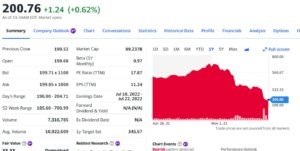GO WOKE, GO BROKE – Netflix subscriptions in India continues to drop even after price slash


After new Twitter owner, Elon Musk had slammed ‘unwatchable’ Netflix for becoming infected by the ‘woke mind virus’ as the streaming giant hemorrhages subscribers. The US company lost 200,000 users between January and March this year, a quarterly report announced yesterday, causing shares to plummet by 25 per cent, with a further 2million subscribers set to leave by June. The company had also been forced to borrow $16billion in a decade to cover its productions and business costs. Responding to a tweet about the subscription service’s devastating performance, Musk said: ‘The woke mind virus is making Netflix unwatchable.’

Netflix seems to be pressing the panic button considering it hasn’t had the best of times of late. The OTT giant has seen dwindling numbers all across the board, with both rating and subscribers falling drastically in India and more so in western countries, which accounts for the major chunk of Netflix’s user-base. However, sticking to their business in India the fall has been even more worrying as word is that the company is yet to turn over a profit for a single financial year ever since its inception in the country.
Netflix has between 4.4 million and 5 million subscribers in the country, depending which consulting firm’s numbers you believe. That compares to 19 million for Amazon and more than 45 million for Disney + Hotstar. And that’s a disappointment given Netflix’s aspirations. The company launched in India five years ago, and as recently as 2018, Chief Executive Officer Reed Hastings said he thought his company could reach 100 million subscribers there.
Whereas, Amazon and Disney+ Hotstar content continues to lead the streaming charts in the country. And Disney+ Hotstar has taken advantage of the appeal of sports, with rights to streaming of Indian Premier League cricket league matches and English Premier League soccer games.
The media giant had announced lately last year (December, 2021) in a blog post that it has cut prices for service in India, where it has faced pressure from streaming offerings from Amazon Prime Video and Disney+ Hotstar, which both have lower price points. Shergill didn’t offer any reason for the change in the blog post, which has led to speculation over what’s behind the move. The most obvious reason seems to be undercutting the competition, which has long been less expensive than Netflix.
Even with the price drop, the latter’s cheapest service remains 78 cents more than Amazon Prime’s lowest level. And Disney+ Hotstar has a service that costs a mere 55 cents per month. That has led to great disparities in subscriptions in the country, where companies are eager to establish a foothold.
Netflix said the Covid boom had ‘created a lot of noise’ and blamed the slowdown on the return to normality after two years of lockdowns. The erosion, coming off a year of progressively slower growth, has rattled another key constituency for Netflix – its shareholders. After revealing its disappointing performance, Netflix shares plunged by more than 25% in extended trading.
It is the first time that Netflix’s subscribers have fallen since the streaming service became available throughout most of the world outside China six years ago. The news deepens troubles that have been mounting for the streaming service since a surge of signups from a captive audience during the pandemic began to slow. It marks the fourth time in the last five quarters that Netflix’s subscriber growth has fallen below the gains of the previous year.
DISCLAIMER: The author is solely responsible for the views expressed in this article. The author carries the responsibility for citing and/or licensing of images utilized within the text.
